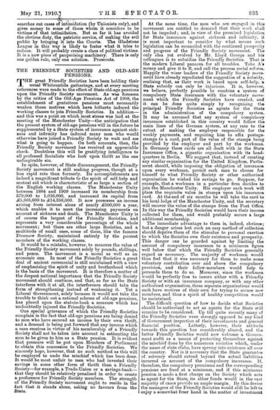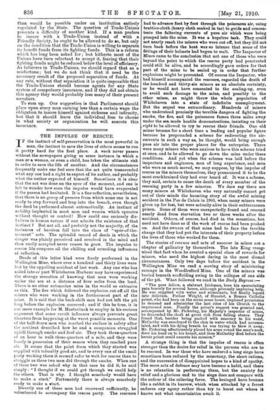THE FRIENDLY SOCIETIES AND OLD-AGE PENSIONS. T HE great Friendly Societies
have been holding their usual Whitsuntide gatherings, and at every meeting references were made to the effect of State old-age pensions upon the Friendly Society movement. As was foreseen by the critics of the Old-Age Pensions Act of 1908, the establishment of gratuitous pensions must necessarily weaken those motives which have hitherto induced the working classes to join Friendly Societies. In addition— and this was a point on which most stress was laid at the meeting of the Manchester Unity—the anticipation that the present system of old-age pensions will in the future be supplemented by a State system of insurance against sick- ness and infirmity has induced many men who would otherwise have joined a Friendly Society to wait and see what is going to happen. On both accounts, then, the Friendly Society movement has received an appreciable check. Doubtless this will be gratifying intelligence to all professed Socialists who look upon thrift as the one unforgivable sin.
In spite, however, of State discouragement, the Friendly Society movement is still making progress, though at a less rapid rate than formerly. Its accomplishments are indeed a magnificent tribute to the spirit of self-help and mutual aid which is characteristic of so large a section of the English working classes. The Manchester Unity between 1884 and 1909 increased its membership from 579,000 to 1,036,000, and increased its capital from £5,805,000 to £14,356,000. It now possesses an income arising from interest alone of nearly £500,000 a year, which enables it to meet the increasing payments on account of sickness and death. The Manchester Unity is of course the largest of the Friendly Societies, and represents a very considerable percentage of the whole movement; but there are other large Societies, and a multitude of small ones, some of them, like the famous Dunmow Society, maintained entirely by the poorest members of the working classes.
It would be a mistake, however, to measure the value of the Friendly Society movement solely by pounds, shillings, and pence. The movement is a moral as well as an economic one. In most of the Friendly Societies a great deal of ancient ceremonial is still maintained with a view of emphasising the spirit of unity and brotherhood which is the basis of the movement. It is therefore a matter of the deepest national importance that the Friendly Society movement should continue, and that, so far as the State • interferes with it at all, the interference should take the form of strengthening instead of weakening it. Yet a Liberal Government, solely because it would not take the trouble to think out a rational scheme of old-age pensions, has placed upon the statute-book a measure which has undoubtedly injured the Friendly Societies. One special grievance of which the Friendly Societies complain is the fact that old-age pensions are being denied to mon who have secured an income by their own thrift, and a demand is being put forward that any income which a man receives in virtue of his membership of a Friendly Society shall not be taken into account in estimating the sum to be given to him as a State pension. It is evident that pressure will be put upon Members of Parliament to obtain this concession to the Friendly Societies. We sincerely hope, however, that no such method as this will be employed to undo the mischief which has been done. It would be most unfair to men who had invested their savings in some other form of thrift than a Friendly Society—for example, a Trade-Union or a savings-bank- that they should be relatively penalised. in order to create a preference for Friendly Society members. The strength of the Friendly Society movement ought to reside in the fact that it stands alone, asking no favours from the State. At the same time, the men who are engaged in this movement are entitled to demand that their work shall not be impeded ; and, in view of the promised legislation for State insurance against sickness and infirmity, it is most important to consider by what means such legislation can be reconciled with the continued prosperity and progress of the Friendly Society movement. The only idea yet evolved by Mr. Lloyd George and his colleagues is to subsidise the Friendly Societies. That is the modern Liberal panacea for all troubles. Take A's money and give it to B, and call the process social reform. Happily the wiser leaders of the Friendly Society move- ment have already repudiated the suggestion of a, subsidy, realising that, as their work is based. upon self-help, a State subsidy can only be injurious. It is, however, we believe, perfectly possible to combine a •system of compulsory State insurance with the voluntary move- ment which the Friendly Societies have created, and it can be done quite simply by recognising the principal Friendly Societies as agents for the State in the administration of the compulsory system. It may be assumed that any system of compulsory insurance established in this country would follow the main lines of the German system, at any rate to the extent of making the employer responsible for the weekly payments, and requiring him to affix • postage- stamps to a card, part of the value of the stamps being provided by the employer and part by the workman. In Germany these cards are all dealt with in the State Insurance Office, a gigantic organisation with its head- quarters in Berlin. We suggest that, instead of creating any similar organisation for the United Kingdom, Parlia- ment should, while imposing the obligation of insurance upon every workman, permit each man to choose for himself to what Friendly Society or other authorised organisation he wished his savings to go. Suppose, for example, that a workman in a particular firm decides to join the Manchester Unity. His employer each week will place the requisite value in stamps upon his insurance card. At the end. of six months he will take the card to his local lodge of the Manchester Unity, and the secretary will recover the value of the stamps from the Post Office. In this way the Friendly Societies would have their income collected for them, and would probably secure a large additional membership.
The immediate advantage to them is, indeed, obvious ; but a danger arises lest such an easy method of collection should. deprive them of the stimulus to personal exertion to which the Societies owe their existence and prosperity. This danger can be guarded against by limiting the amount of compulsory insurance to a minimum figure well below that which the Friendly Societies generally regard as necessary. The majority of workmen would thus feel that it was necessary for them to make some voluntary contribution over and above the compulsory provision, and their fellow-members would help to persuade them to do so. Moreover, since the workmen would. be perfectly free to insure either with a Friendly Society or with an insurance company, or with any other authorised organisation, these separate organisations would each have motives of their own for trying to secure new members, and thus a spirit of healthy competition would be maintained.
The difficult question of how to decide what Societies should be authorised to act as agents for the State still remains to be considered. Up till quite recently many of the Friendly Societies were strongly opposed to any kind of Government inspection of their investments and general financial position. Latterly, however, their attitude towards this question has considerably altered, and the better Friendly Societies would now welcome a Govern- ment audit as a means of protecting themselves against the mischief done by the numerous societies which, under the name of slate clubs, have sprung into existence all over the country. Nor is it necessary that the State guarantee of solvency should extend beyond the actual liabilities incurred on account of the compulsory insurance. If, therefore, the compulsory premiums and the corresponding pensions are fixed at a minimum, and if this minimum pension is made a first charge on the Society which acts as agent for the State, its other funds would in the vast majority of cases provide an ample margin. By this device the managers of the Friendly Societies would still be left to enjoy a somewhat freer hand in the matter of investment than would be possible under an institution entirely regulated by the State. The question of Trade-Unions presents a difficulty of another kind. If a man prefers to insure with a Trade-Union instead of with a Friendly Society, he ought to be allowed to do so, but only on the condition that the Trade-Union is willing to separate its benefit funds from its fighting funds. This is a reform which has long been asked for ; but hitherto most of the Unions have been reluctant to accept it, fearing that their fighting funds might be reduced below the level of efficiency. As believers in Trade-Unions, we should regard that as a misfortune ; but we do not think that it need be the necessary result of the proposed separation of funds. At any rate, without that separation it is quite impossible that the Trade-Unions should become agents for any State system of compulsory insurance, and if they did not obtain this agency they would probably lose many of their present members.
To sum up. Our suggestion is that Parliament should place upon every man earning less than a certain wage the obligation to insure himself against sickness and infirmity, but that it should leave the individual free to choose in what society or organisation he will execute this insurance.







































 Previous page
Previous page